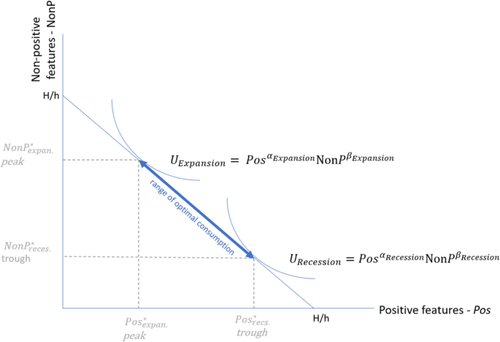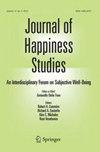危机背景音乐:在经济和社会逆境中更偏好积极的音乐
IF 3.1
2区 心理学
Q1 PSYCHOLOGY, MULTIDISCIPLINARY
引用次数: 0
摘要
本文研究了在悲伤、忧虑和不确定的时期(COVID-19 危机)与往年相比,人们消费最多的歌曲中的积极因素。为了进行分析,我们利用 31 个经合组织国家五年间每周音乐消费模式的数据集,创建了一个原创的积极音乐指标。结果表明,经济商业周期和 COVID-19 大流行等事件带来的负面冲击会增加积极歌曲的消费,这表明社会通过积极音乐来弥补对幸福感的负面影响。我们的结论是,社会会根据社会经济状况调整基于情感的音乐消费偏好。本文章由计算机程序翻译,如有差异,请以英文原文为准。

The Soundtrack of a Crisis: More Positive Music Preferences During Economic and Social Adversity
This paper studies the positiveness in most consumed songs during a period of sadness, worry and uncertainty: the COVID-19 crisis in comparison with previous years. In order to perform the analysis, we create an original positive music indicator using a dataset of weekly patterns for music consumption in 31 OECD countries over a five year period. Results show that negative shocks from events such as economic business cycles and the COVID-19 pandemic increase the consumption of positive songs, suggesting that society compensates the negative impact on well-being with positive music. We conclude that society adapts sentiment-based music consumption preferences according to the socioeconomic situation.
求助全文
通过发布文献求助,成功后即可免费获取论文全文。
去求助
来源期刊

Journal of Happiness Studies
Multiple-
CiteScore
8.60
自引率
6.50%
发文量
110
期刊介绍:
The international peer-reviewed Journal of Happiness Studies is devoted to theoretical and applied advancements in all areas of well-being research. It covers topics referring to both the hedonic and eudaimonic perspectives characterizing well-being studies. The former includes the investigation of cognitive dimensions such as satisfaction with life, and positive affect and emotions. The latter includes the study of constructs and processes related to optimal psychological functioning, such as meaning and purpose in life, character strengths, personal growth, resilience, optimism, hope, and self-determination. In addition to contributions on appraisal of life-as-a-whole, the journal accepts papers investigating these topics in relation to specific domains, such as family, education, physical and mental health, and work.
The journal welcomes high-quality theoretical and empirical submissions in the fields of economics, psychology and sociology, as well as contributions from researchers in the domains of education, medicine, philosophy and other related fields.
The Journal of Happiness Studies provides a forum for three main areas in happiness research: 1) theoretical conceptualizations of well-being, happiness and the good life; 2) empirical investigation of well-being and happiness in different populations, contexts and cultures; 3) methodological advancements and development of new assessment instruments.
The journal addresses the conceptualization, operationalization and measurement of happiness and well-being dimensions, as well as the individual, socio-economic and cultural factors that may interact with them as determinants or outcomes.
Central Questions include, but are not limited to:
Conceptualization:
What meanings are denoted by terms like happiness and well-being?
How do these fit in with broader conceptions of the good life?
Operationalization and Measurement:
Which methods can be used to assess how people feel about life?
How to operationalize a new construct or an understudied dimension in the well-being domain?
What are the best measures for investigating specific well-being related constructs and dimensions?
Prevalence and causality
Do individuals belonging to different populations and cultures vary in their well-being ratings?
How does individual well-being relate to social and economic phenomena (characteristics, circumstances, behavior, events, and policies)?
What are the personal, social and economic determinants and causes of individual well-being dimensions?
Evaluation:
What are the consequences of well-being for individual development and socio-economic progress?
Are individual happiness and well-being worthwhile goals for governments and policy makers?
Does well-being represent a useful parameter to orient planning in physical and mental healthcare, and in public health?
Interdisciplinary studies:
How has the study of happiness developed within and across disciplines?
Can we link philosophical thought and empirical research?
What are the biological correlates of well-being dimensions?
 求助内容:
求助内容: 应助结果提醒方式:
应助结果提醒方式:


